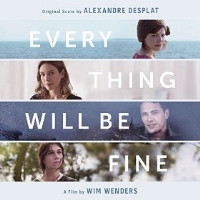- Composed by Alexandre Desplat
- Wenders Music / 2015 / 45m
Directed by Wim Wenders, Every Thing Will Be Fine stars James Franco as a man who causes a car accident; the film examines his guilt and search for redemption over a period of many years. It was shown at the Berlin Film Festival back in February and has been released around the world in stages throughout the year, with the American release scheduled towards the end of the year, around Oscar season (but if the majority of the reviews are to be believed, that may be rather wishful thinking).
After his incredible (and prolific) 2014 it feels like it’s been a while since the last Alexandre Desplat album, but that’s because most of the films he has scored over the year have their American release (and hence soundtrack) clustered together around the end. He reportedly recorded this score just one week before the film was premièred in Berlin. It was fascinating to think what the composer would write for this, especially given how strong The Tree of Life – written for another director who makes contemplative, visually stunning films – was.
What he wrote is a very melodic, very calm score for a string orchestra and piano. The opening cue is striking: a piano motif seems to float in the air, hanging around like a wisp of smoke; then a tragic theme for strings, really rather John Barry-like in the main melody, Desplat echoing that composer’s great ability to write genuinely sad but genuinely beautiful music. Where it develops from that melody, Desplat very much goes his own way – the writing for the strings is truly striking, layered beautifully, the playing exquisite.
The second cue, “The House in the Snow”, is even sadder and features another of the score’s key features – pauses, as briefly suggested in the opening to the first cue but more prominent here. The sense of things stopping for a moment and then continuing is very cleverly done – taking stock, getting back along the way. A swirling figure repeats through “The Accident” – incessant, intense – and is then deconstructed in the tragic “Autumn”, the subtle plucked double bass in conversation with high-register piano. “Looking for the Light” begins with a very classical feel but turns into a piece of unmistakable Desplat, a repeated-and-developed figure again the mainstay but this time there is the feel of a determined journey, some movement rather than stagnation in the repetition. The journey continues in “Spring”, which does have a lighter (if not exactly happier) feeling to it.
I love the variants on the beautiful main theme – the first is “Tomas Writes” which is elegiac, strained, anguished. There’s time too for a fuller examination of that little piano motif from the opening of the album – in “On the Ferry” Desplat develops it into a fully-formed melody, the unaccompanied piano breathing. The standalone “A Strange Phone Call” is the most prototypical piece of Alexandre Desplat here, a gentle waltz which manages a psychological edge – outstanding dramatic music. More unusual is the unexpectedly pacy, edgy “The Letters”, urgent and rolling along like a runaway train.
In total contrast, “Suicide Attempt” is resigned, unsurprisingly funereal, piercingly sad. “Book Signing in the Park” is multi-faceted, kaleidoscopic almost, very simple elements dancing around separately but turning into something altogether more complex when brought together. Anguish runs through “The Fairground Disaster”, the score’s secondary theme being used to dial up the emotions and in particular the tragic feeling. The piano jabs its way through “Winter”, but then comes real brightness – for the first time, really – in “Tomas’s Success”, the piano theme being pushed for once into sunnier territory. “Kate Leaves the House” starts with warmth and again there’s John Barry about it, the way the melody swells from the strings over the piano. “Summer” is, ironically, black as coal as it begins, a low piano chord crashing under a dark violin fantasy – a rich depth emerges through the cue.
“Kate’s House at Night” reprises the material from “The House in the Snow”, the same stop-start style; the difference this time is the warmth that gets injected as the piece moves forward, the music returning slightly happier and more complete after each pause. “Christopher’s Sorrow” is a gorgeous return to the main theme, the different string sections being used like different voices speaking together. Then the score concludes with “Reconciliation”, a beautiful ending which brings everything full circle.
Every Thing Will Be Fine is a rich score, intriguing and rewarding throughout. Desplat’s music is typically thoughtful and this is no exception; the emotional depth he brings to this score is what sets it apart. The story’s journey from tragedy to redemption is perfectly mirrored by the music, which is full of nuance and while mostly pretty (sometimes very) sad it is a satisfying, fulfilling album.
Rating: ****
facebook.com/moviewave | twitter.com/MovieWaveDotNet | amazon.com













It kinda reminded me of Georges Delerue, in the way Desplat extracts the sadness from his string orchestra.
Anyway, a good score, maybe a little to emotionally restrained in my opinion, but beautiful in a strange way.